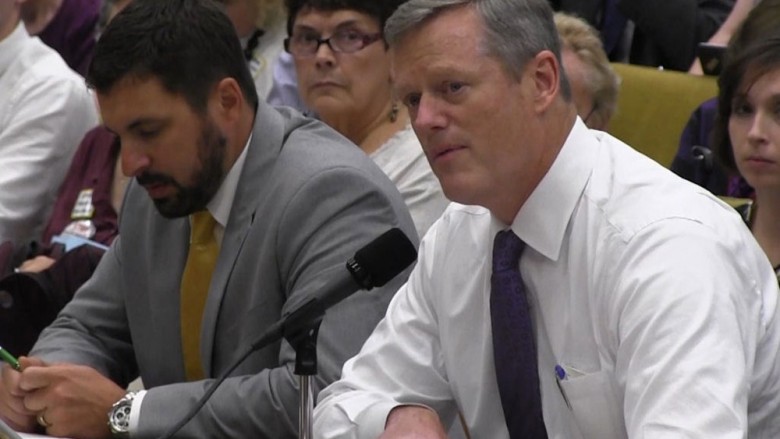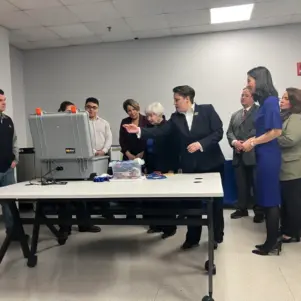Lawmakers inundated with testimony on state’s energy mix
By State House News Service | September 30, 2015, 6:28 EDT
 Gov. Baker and Sec. Beaton testify in support of the administration’s energy bills. [Photo: Antonio Caban/SHNS]
Gov. Baker and Sec. Beaton testify in support of the administration’s energy bills. [Photo: Antonio Caban/SHNS] STATE HOUSE — Gov. Charlie Baker opened the door on Tuesday to including off-shore wind in his immediate energy plans if projects can prove competitive on pricing, prodding lawmakers to act with urgency this fall on two of his initiatives intended facilitate the solar industry and bring large-scale hydroelectric power to Massachusetts.
House and Senate lawmakers are working to update the state’s energy laws this session in order to diversify the state’s energy mix to meet carbon emission reduction goals while also controlling costs and meeting demand during peak seasons.
The Senate passed a bill to lift the cap on solar net metering – the amount of solar power that can be sold back to the grid at retail rates – and House leaders are holding out hope of completing a more comprehensive energy bill before the end of November.
Sen. Benjamin Downing, the co-chair of the energy committee with Rep. Thomas Golden, has his own comprehensive renewable energy bill pending before the committee.
Baker, testifying on Tuesday before the committee, pitched his efforts to import large-scale hydroelectric power into Massachusetts as critical to meeting the state’s carbon emissions reductions goals by 2020, a plan adopted by his predecessor that the Republican governor has fully embraced.
One of Baker’s bills (S 1965) would authorize long-term contracts for hydroelectric power, while another (H 3724) would increase the net metering cap on public and commercial solar projects to 6 percent and 7 percent respectively of peak loads in regional service territories. The Senate-approved bill would lift the cap on net metering until the state hits its solar target of 1,600 megawatts, which officials estimate could happen in 2018.
[Clips of: Baker Energy Testimony]
Describing Massachusetts as being at a “crossroads” in terms of meeting its environmental goals while also working to drive down some of the highest energy costs in the country, Baker called for the state to cultivate a diverse portfolio of energy sources, including solar, wind, hydro and natural gas to replace retiring fossil fuel generation plants.
While the state has set a goal of reducing carbon emissions 25 percent from 1990 levels by 2020, the administration said that as of 2012 emissions were only down 15 percent.
“Absent timely passage of this proposal and the incorporation of at least 1,200 megawatts of hydropower into our generation mix, it will be very difficult to meet our 2020 goals, which I want to meet,” Baker told the Committee on Telecommunications, Utilities and Energy.
Some critics have expressed concern that Baker’s focus on incentivizing hydropower could crowd out other renewable sources such as wind. Furthermore, with Canadian hydropower being a likely benefactor of the governor’s proposal, some lawmakers and advocates said that purchasing the renewable energy sources will come at the expense of the economy at home where thousands of jobs are connected to other energy industries.
“Unless ‘Big Hydro’ is only chosen as part of a comprehensive energy plan, the size of these contracts will preclude any other solicitations in the future,” testified Rep. Antonio Cabral, a New Bedford Democrat.
Cabral and others, like Sen. Marc Pacheco, spoke about the potential for off-shore wind power. Pacheco, who said he recently returned from Denmark where offshore wind is being tapped as a major source of renewable energy, urged the Baker administration to “roll up your sleeves and a take a look at this offshore wind piece.”
“If we can put that in to what you are trying to do, governor, we can really create a future that we can be proud of,” Pacheco said.
Energy Secretary Matthew Beaton, who testified alongside Baker, said the administration sees offshore wind as potentially being a “very powerful” technology in the future, but raised immediate cost concerns. “We also have to consider (Denmark’s) cost of a kilowatt hour is more than double what it is in the Commonwealth,” he said.
Pacheco countered by telling Beaton that a major developer at the White House’s offshore wind conference this week said new technology is enabling offshore wind to compete “head to head” with new natural gas plants on price.
Baker responded, “Put that in the bill. Tell us to go out and explore the market.”
The hearing at the State House drew a mix of environmental, solar and clean energy advocates, energy industry lobbyists and utility companies – each with their own stake in the outcome of the debate.
In the crowded auditorium where testimony raged on for hours on Tuesday, solar industry advocates urged lawmakers to diversify the state’s energy mix and to be mindful of the details of the mix of energy sources and the importance of boosting the state’s own renewable energy and emerging technologies industries.
In addition to promoting energy efficiency to save money, several representatives of environmental groups cautioned against over-reliance on natural gas and warned against policies that could lead to imported fracked gas and hydropower from Canada.
While renewable energy sources are sometimes criticized for not being cost-competitive with other power sources, environmental advocates argued investments in renewable energy now will pay long-term dividends and boost a local jobs base.
Proponents of lifting the solar net metering cap argue that the limits have stalled solar installation in 172 communities served by National Grid where the cap has been hit. The utility opposes lifting the cap.
Amy Rabinowitz, vice president and deputy general counsel at National Grid, said the utility company continues to receive proposals for public and commercial solar installations, and has projects moving forward despite the cap.
Since May, National Grid has received 231 project applications accounting for 84 megawatts of solar electricity that would be subject to the cap and only reimbursed at wholesale rates.
Even if developers are only repaid at the wholesale electricity price and not the retail rate under net metering, Rabinowitz said Massachusetts still offers higher subsidies than surrounding states. “We think these projects will go ahead,” she said.
Other solar advocates, including Sean Garren of Vote Solar, worry about what will happen under Baker’s plan after the state reaches its target of 1,600 megawatts of solar power. Beaton said the governor’s bill would give the maturing solar industry time to adjust to a phasing out of the more lucrative subsidies that currently cost ratepayers about $200 million a year.
After reaching the solar targets, the administration has proposed a system that would credit homeowners selling solar power back to the grid at the retail rate, but limit commercial projects to the wholesale rate and municipal or low-income projects at a rate in the middle of the two.
“The governor’s bill fundamentally gets the compensation for solar wrong,” Garren said. “Solar adds a lot of value to this state. It adds economic value but it also adds value to the distribution system because we’re using less energy, it adds value because you need less transmission lines and it helps to address our environmental problems. The governor’s bill gives no credit, no value to any of those contributions.”
A recent Massachusetts Taxpayers Foundation report found that any progress achieved to control costs after the state deregulated the electricity market in 1997 has stalled, with the price gap between other states now the same as before deregulation.
Electricity prices in Massachusetts, according to MTF, exceed the national average for commercial payers by 38 percent and 93 percent for industrial payers, making the state the sixth most-costly state for commercial payers and third most-costly for industry.
While MTF supports Baker’s goal of transitioning to a stable solar market and ensuring that costs are borne by all ratepayers, the group said it has “concerns” with the governor and Senate’s proposal to lift the net metering caps, suggesting it could force industrial and commercial ratepayers to shoulder an additional $160 million in energy costs.
“Net metering was introduced as a way to jumpstart a nascent industry,” Taxpayers Foundation President Eileen McAnneny said in written testimony. “Now that the industry is more established, we should eliminate or reduce those subsidies.”
New England Clean Energy Center President Peter Rothstein indicated his support for long-term renewable energy contracts that derive power from a variety of sources, including hydropower that he said could “firm” other sources like onshore wind at times when wind generation dips.
While Rothstein backed the immediate lifting of caps on solar net metering, he echoed others’ concerns that the Baker administration’s plan for solar subsidies after reaching the target goal of 1,600 megawatts would reimburse at a “wholesale level that will be too uncertain/variable for project financing and in many cases too low to maintain the robust and varied solar industry that has developed in Massachusetts.”
Paul Gaynor, executive vice president of SunEdison, testified in support of adding wind to the long-term competitive procurement of renewable energy, arguing that large-scale onshore wind fields have proven to be economically competitive.
“You have to go big or come home,” Gaynor said, explaining that scale makes a difference if regulators want to control price.
SunEdison alone has two gigawatts of wind power in Maine “that can be ready” to comply with the procurement process laid out by Baker, according to Gaynor, who also said the permitting process in Massachusetts, however, makes doing anything on a large enough scale to be cost competitive in Massachusetts “difficult.”
Interest in the energy bill is high — the list of witnesses signed up to testify at Tuesday 1 p.m. hearing ran for nine pages. At 5:30 p.m., Downing said the panel had 7.5 pages of witnesses remaining.
— Written by Matt Murphy
Copyright State House News Service










